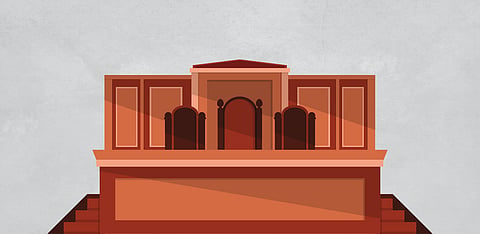

A chief justice of a high court is required to initiate the proposal to fill up a vacancy at the high court six months prior to its occurrence. This timeline is often not adhered to, Union Minister of Law and Justice Arjun Ram Meghwal told Lok Sabha on Friday.
—
THE Supreme Court of India might be functioning at its full strength at present, but India's high courts are functioning with only a little over two-thirds of the Bench capacity, Union Minister of Law and Justice Arjun Ram Meghwal in Lok Sabha on Friday.
As against the sanctioned strength of 1,114 judges in various high courts, a total of 324 posts of judges are lying vacant.
This means that only 790 judges are shouldering the burden of running India's high courts with mounting case pendencies.
As on December 4, 2023, 122 proposals are at various stages of processing. Out of these 122 proposals, 87 proposals were sent to the Supreme Court Collegium for seeking advice against which the collegium has provided advice on 45 proposals which are at various stages of processing by the government, the minister informed Lok Sabha.
The minister added that a total of 42 proposals are under consideration with the collegium. Recently received 35 proposals are being processed for seeking the advice of the collegium. However, recommendations are yet to be received from high court collegiums in respect of the remaining 198 vacancies.
Terming the appointment process a continuous, integrated and collaborative process between the executive and the judiciary, the minister told Lok Sabha that as a result of the collaborative process during the year 2022, 165 judges were appointed in various high courts and eight transfers among high courts were made (two of chief justices and six of judges) and during the year 2023, a total of 110 judges have been appointed in various high courts and 34 judges have been transferred among various high courts till December 4, 2023.
The minister revealed that 34 judges have been transferred from Madras, Calcutta, Patna, Jammu & Kashmir and Ladakh, Punjab and Haryana, Allahabad, Patna, Kerala, Telangana, Rajasthan, Madhya Pradesh, Gujarat, Andhra Pradesh and Karnataka High Courts during the year 2023.
Judges of the Supreme Court and high courts are appointed under Article 124, 217 and 224 of the Constitution of India and according to the procedure laid down in the Memorandum of Procedure (MoP) prepared in 1998 pursuant to the Supreme Court judgment of October 6, 1993 (Second Judges case) read with their advisory opinion of October 28, 1998 (Third Judges case).
As per the MoP, the initiation of the proposal for appointment of judges in the high courts vests with the chief justice of the concerned high court.
A chief justice of a high court is required to initiate the proposal to fill up a vacancy at the high court six months prior to the occurrence of the vacancy.
"This timeline is often not adhered to by high courts. All the names recommended by a high court collegium are sent with the views of the government to the Supreme Court Collegium for advice. The government, however, appoints only those persons as judges of high courts who are recommended by the collegium," the minister said.: